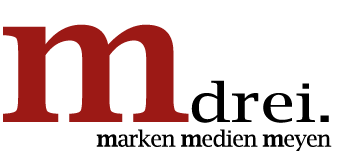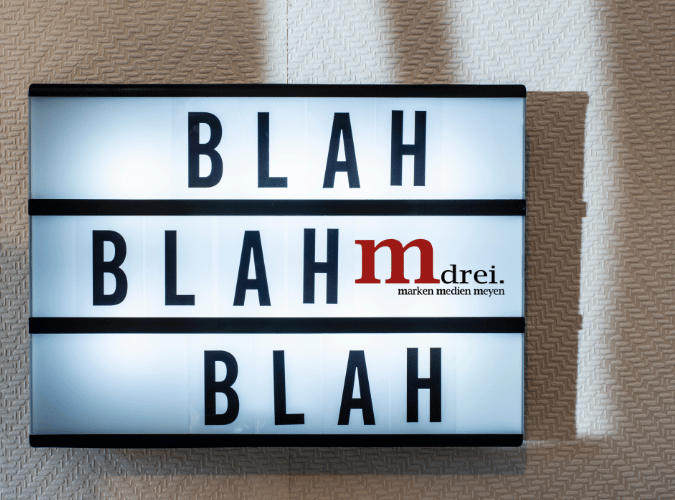A claim or slogan registered in the trademark register prevents competitors from advertising with the same claim and confusing potential customers. Trademark protection ensures exclusivity at the core of your brand.
More and more companies are turning to slogans and claims to convey an advertising message with charm and wit. Surely you also know which product or brand is behind "Cola kisses orange", "Square. Practical. Good", "We love food" or "I love it".
Claims and slogans are short, catchy slogans. Claims stand for a corporate philosophy on an ongoing basis, while slogans regularly accompany a specific advertising measure or an individual product only temporarily.
Trademark protection for claims and slogans
However, really good slogans are readily accepted and copied by competitors. It may therefore be advisable to use your advertising slogan to be registered as a trademark in the trademark register. A trademark is a distinctive sign that serves to distinguish the goods or services of one company from those of another. This suitability is called distinctiveness.
In official practice, the German Patent and Trade Mark Office (DPMA) and the European Intellectual Property Office (EUIPO) are very reluctant to recognize the distinctiveness of slogans and claims. As a result, decisions are often sent out rejecting them. The Federal Patent Court (BPatG) has also often followed this official practice and refused to protect slogans. This has essentially historical reasons and goes back to the WZG, the predecessor of the MarkenG.
However, the Federal Court of Justice (BGH) does not share this negative stance and has often ruled in favor of trademark applicants in the recent past. According to the BGH, even in the case of slogans, it is not a question of particular creativity and exceptional wordplay, but merely of whether the word sequence is distinctive or not. However, the BGH also requires a certain product reference.
In practice, this means that short and snappy slogans are more likely to be registered as a trademark, while longer sentences or even paragraphs are considered unsuitable for advertising a product and are therefore likely to be rejected.
Protection for slogans that are not registered as trademarks
Even if your claim has not been granted trademark protection, enforcing your rights is not necessarily hopeless. German law has a few more tricks up its sleeve.
Slogan protection under competition law
Competition law (UWG) recognizes the supplementary protection of performance under competition law, which is often referred to as imitation protection for short. This is stated in § 4 No. 3 UWG:
Anyone who
who offers goods or services that are an imitation of the goods or services of a competitor, if he
a) causes an avoidable deception of the customers about the operational origin,
b) inappropriately exploits or impairs the value of the counterfeit goods or services, or
c) has dishonestly obtained the knowledge or documents required for the imitation.
In this context, "goods or services" within the meaning of the law is to be interpreted broadly, meaning that designs or even slogans also fall under the protection of the standard. However, it is undisputedly recognized in case law that protection against imitation is only granted if the subject of protection - in this case the slogan - has a competitive character of its own. The slogan must therefore be even more creative than it would have to be in the context of a trademark application. Alternatively, competitive originality can also be achieved through reputation, whereby in case of doubt the user of the slogan is responsible for proving the reputation.
Protection for slogans under copyright law
Under copyright law, it is possible to protect a slogan. However, a well-known hurdle of copyright law must be overcome, namely the level of creativity. Only once this has been reached can the slogan be protected by copyright and claim all associated ancillary copyrights in accordance with the Copyright Act.
It is often difficult to determine the level of creativity and thus whether a slogan is eligible for protection. The slogan must be particularly imaginative, original, witty and creative in order to meet these requirements. As slogans are usually short, concise and to the point, there is little room for unusual creations.
It is therefore rare that a slogan reaches the required level of creativity and can therefore be protected by copyright. The courts are therefore reluctant to recognize advertising slogans as worthy of protection. Decisions in this regard are mostly older and recent cases are rare.
Conclusion: Protection of slogans and claims - complex and individual
Slogans and claims are important components of brand communication, but their protection is legally complex. Although registration as a trademark is possible, it is often difficult due to the high requirements for distinctiveness.
In practice, many applications fail because of this hurdle.
Competition law and copyright law offer alternatives to trademark protection. Creativity and awareness of the slogan play a decisive role here.
Whether and which protection is possible in individual cases depends on the individual characteristics of the slogan and the specific usage situation.
Recommendation:
Companies that want to protect their slogans and claims with legal certainty should turn to an experienced lawyer like Robert Meyen. He can check the prospects of success of a trademark application or other property right and provide clients with comprehensive advice.

